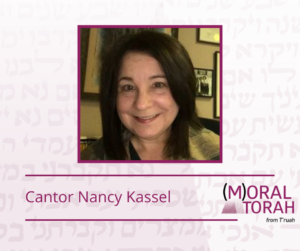A D’var Torah for Parshat Ki Tisa by Cantor Nancy Kassel
I’m a cantor. I have used my voice in song ever since I can remember, singing Jewish liturgy and other sacred and contemporary texts: lyrical songs of peace, plaintive songs of healing, and enthusiastic songs of inspiration. However, when I am emotionally charged with sorrow, frustration, or anger, the words and notes get caught in my throat.
Moses, in Parshat Ki Tisa, found himself dumbstruck when he descended Mt. Sinai, tablets of the law in hand, only to see the impatient Israelites singing and dancing around the golden calf they had created in his 40-day absence. Even though God had warned Moses of what he was about to see, the disappointment and disloyalty were too much for him and down went the tablets, shattering into pieces.
So much can be said and asked about anger. Is it good, bad, justified, or acceptable in moderation? In recent years, the decibel levels of voices representing opposing beliefs and perspectives have risen disproportionately to the voices of those who are being silenced. I have watched with disbelief as more and more states (including my own) have adopted laws that result in voter suppression, the silencing of voices that are entitled to be heard. While I haven’t had stone tablets to throw down on the ground, I’ve been tempted to pick up any nearby object to hurl at the TV or computer.
Sign up to receive (M)oral Torah in your inbox each week.
What does Judaism have to say about anger? Much of our tradition comes out against it. Moses wasn’t allowed into the promised land because of anger issues. In Proverbs (16:32), we read that the one who is slow to anger is better than the mighty. In the Talmud (Pesachim 66b), we read “Anger will cause a sage to lose his wisdom, a great person who is destined for greatness to forfeit it.” Maimonides takes it a step further by saying, “One who becomes angry is as though that person had worshiped idols.”
We are sometimes tempted to think that righteous indignation is different, a good form of anger. In 2010, Rabbi Jay Michaelson wrote an article for The Forward in which he cautions the reader that righteous indignation “clothes incivility in the pious garb of religion” and temper tantrums become justified by Jewish values. Michaelson went on to say that “even when there is a viable religious pretext, getting angry is a personal failing, not a religious value.”
But a teaching attributed to Rabbi Abraham Isaac Kook resonates with me the most, because it frames anger in what feels to me a more realistic way: When anger is a mode of life or when expressed in an unjustified manner, it is prohibited by Judaism. But if a person is wronged, they are allowed to express their natural feelings, including anger.
Find more commentaries on Ki Tisa.
Rav Kook seems to be giving the ok sign for venting, within reason. Venting is cathartic, but it is not enough. Ideally, some sort of action should be taken to change the underlying reasons for our anger and frustration. Much of my life, I have participated in acts of tikkun olam — but only when convenient for me with respect to work and family obligations, all the while admiring those who have managed to more consistently “walk the talk.” A recent opportunity to join other Jewish clergy in Brunswick, Georgia, (spearheaded by Rabbi Rachael Bregman and T’ruah) to show support for the family of Ahmaud Arbery lit a fire within me.  I’m at a point in my life where I can devote more time and energy to help give voice to the marginalized, most especially those who are affected by laws that suppress accessibility to voting. I’ve signed petitions to lawmakers but I know there is more I can do. I ask myself if “too little too late” applies to me. Then I am reminded: “It is not up to you to finish the work, yet you are not free to avoid it.” (Pirkei Avot 2:16)
I’m at a point in my life where I can devote more time and energy to help give voice to the marginalized, most especially those who are affected by laws that suppress accessibility to voting. I’ve signed petitions to lawmakers but I know there is more I can do. I ask myself if “too little too late” applies to me. Then I am reminded: “It is not up to you to finish the work, yet you are not free to avoid it.” (Pirkei Avot 2:16)
What’s anger got to do with it? The lesson for me, from Parshat Ki Tisa, is not to let the anger render me speechless or get stuck in vent mode, but rather to allow it to embolden me into action and be assured that every contribution will make a difference.
Nancy Kassel serves as cantor for Temple Beth Tikvah in Roswell, Georgia. She is a member of The American Conference of Cantors and chair of the Union of Reform Judaism’s Joint Cantorial Placement Commission.

